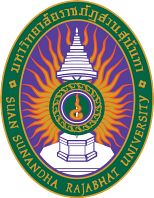ปัจจัยส่วนบุคคลที่ส่งผลต่อสมรรถนะด้านนวัตกรรมของนักศึกษาฝึกประสบการณ์ วิชาชีพครู สาขาวิชาสังคมศึกษา หลักสูตรครุศาสตรบัณฑิต มหาวิทยาลัยราชภัฏสวนสุนันทา
คำสำคัญ:
สมรรถนะด้านนวัตกรรม, ปัจจัยส่วนบุคคล, นักศึกษาฝึกประสบการณ์วิชาชีพครูบทคัดย่อ
การวิจัยครั้งน้ีมีวัตถุประสงค์ 1) เพื่อศึกษาระดับสมรรถนะด้านนวัตกรรมของนักศึกษาฝึกประสบการณ์ วิชาชีพครู สาขาวิชาสังคมศึกษา หลักสูตรครุศาสตรบัณฑิต มหาวิทยาลัยราชภัฏสวนสุนันทา ปีการศึกษา 2560 2) เพื่อศึกษาปัจจัยส่วนบุคคลที่ส่งผลต่อระดับสมรรถนะด้านนวัตกรรมตามความคิดเห็นของนักศึกษาฯ 3) เพื่อ ศึกษาความสัมพันธ์ระหว่างปัจจัยส่วนบุคคลด้านความรู้ ด้านทักษะการคิด และด้านคุณลักษณะส่วนบุคคลของ นักศึกษาฯ และ 4) เพื่อศึกษาอิทธิพลของปัจจัยส่วนบุคคลที่ส่งผลต่อสมรรถนะด้านนวัตกรรมของนักศึกษาฯ จานวน 70 คน โดยผู้วิจัยเลือกกลุ่มตัวอย่างนักศึกษาด้วยวิธีการสุ่มอย่างง่าย จานวน 59 คน แล้วดาเนินการวิจัย โดยใช้แบบประเมินสมรรถนะ แบบสารวจความคิดเห็น และแบบประเมินปัจจัยส่วนบุคคล จากนั้นวิเคราะห์ข้อมูล ด้วยการคานวณค่าความถี่ ค่าร้อยละ ค่าเฉลี่ยเลขคณิต (̅) ส่วนเบ่ียงเบนมาตรฐาน (S.D.) แล้วแปลความค่าเฉลี่ย ตามเกณฑ์และใช้โปรแกรมสาเร็จรูปSPSS ทดสอบค่าสัมประสิทธิ์สัมพันธ์แบบเพียร์สันและค่าสัมประสิทธิ์ ถดถอยพหุคูณ เพ่ือทดสอบสมมุติฐานการวิจัย ซ่ึงผลการวิจัยพบว่า 1) สมรรถนะด้านนวัตกรรมของนักศึกษาฯ มี ค่าเฉลี่ยรวมในระดับสูง (̅=3.69 S.D.= 0.27) 2) ปัจจัยส่วนบุคคลท่ีส่งผลต่อสมรรถนะด้านนวัตกรรมตามความ คิดเห็นของนักศึกษาฯ ได้แก่ ความรู้ 6 ตัวแปร ทักษะการคิด 6 ตัวแปร และคุณลักษณะส่วนบุคคล 12 ตัวแปร 3) ระดับปัจจัยส่วนบุคคลที่ส่งผลต่อสมรรถนะด้านนวัตกรรมของนักศึกษาฯ ท้ัง 3 ด้าน มีค่าเฉลี่ยอยู่ในระดับสูง (̅=3.76 S.D.= 0.23, ̅=3.62 S.D.= 0.78, ̅=3.69 S.D.= 0.54 ตามลาดับ) 4) ระดับปัจจัยส่วนบุคคลสัมพันธ์ กับระดับสมรรถนะดา้นนวัตกรรมของนักศึกษาฯอย่างมีนัยสาคัญทางสถิติที่ระดับ.05และ5)ปัจจัยส่วนบุคคล3 ด้าน จานวนรวม 24 ตัวแปร ไม่มีอิทธิพลต่อความสามารถในการเตรียมการ การค้นคว้าข้อมูล และการนามาใช้ อย่างมีนัยสาคัญทางสถิติที่ระดับ .05 แต่ปัจจัยส่วนบุคคลอย่างน้อย 1 ตัวแปร มีอิทธิพลต่อความสามารถในการ ออกแบบ การต่อยอด การสร้างสิ่งใหม่ การประเมินผล และการปรับปรุงแก้ไข อย่างมีนัยสาคัญทางสถิติที่ระดับ .05
เอกสารอ้างอิง
Jantakoon, J. (2017). The Development of Learning Activities to Enhance Students Teachers’ Competency in Educational Innovation Focus on Local-Related Content Using Contemplative Education Approach and Peer Tutoring Technique. Journal of Community Development Research (Humanities and Social Sciences). Year 10th (1), 156-169.
Kachapai, M. and Team. (2015). The Development of A Blended Instructional Model To Enhancing Knowledge and Competencies on Educational Innovation and Information Technology for Bachelor of Education Students Srinakharinwirot University. Social Sciences Research and Academic Journal. Year 10th (291), 71-86.
Kamket, W. (2008). Research Methodology in Behavioral Science. (2nded). Bangkok: Chulalongkorn University.
Kaplan, Robert S. and Norton, David P. (2004). Strategy MAPS : converting intangible assets into tangible outcome. United States of America : Harvard Business School Publishing Corporation.
Kulbutr, N. (2013). Transition of Thai Society. Access on November 8, 2017. Retrieved from http://sd-group2-logspot.com/2012/12/53241905
Marchal, Joaquin Moreno. (2010). Developing innovation competencies for organizations. Spain : Universidad de Cadiz.
Meejang, S. and Wiboonrungsan. (2012). The Development of Competencies Needed for the Performance of Teachers in Basic Schools In Phitsanulok Province By Using Knowledge Management. MSU Journal. Year 31st (1), 111-123.
Office of the Education Council. (2016). Status of Production and Development of Teachers in Thailand 2015. Bangkok: Century.
Parson, C. (1996). Developing New Skills in Teachers. The Needs of Teachers. London: Red Books.
Phoowittaya, A. (2005). Human resource management based on Competency. Access on June 6, 2017. Retrieved from http://www.hrcenter.co.th
Reungtrakul, A. (2000). Statistics Applied to Behavior Sciences. (6th ed). Bangkok: Chulalongkorn University.
Sang-orn, S. (2017). Innovation Competencies of Municipalities in Samut Prakan Province. DPU Journal. Year 39th (99), 206-220.
Secretariat Office of the Teachers Council of Thailand. (2005). Teacher Professional Standards. Bangkok: Secretariat Office of the Teachers Council of Thailand.
Secretariat Office of the Teachers Council of Thailand. (2013). Announcement of the Teachers Council of Thailand Board on Professional Standards. Bangkok: Secretariat Office of the Teachers Council of Thailand.
Sereerat, S and team. (1998). Marketing Strategies, Marketing Management and Case Studies. Bangkok: Diamond in Business World.
Sirimai, K. (2011). Competencies. Bangkok: Rajamangkala University of Technology Phra Nakorn. Siritharangsri, P. (2014). Thai Teachers’ Enhancement in 21st Century. Documents for academic conferences “Learning to Turn Thailand” May 6-8, 2014. Quality Learning Foundation
[QLF]. Impact Arena, Thailand.
Sutthawart, W. and Pasunon, P. (2015). Factors Affecting Individual Innovative Behavior in The
Office of Basic Education Commission. Veridian E-Journal Silapakorn University. Year 8th
(January - April), 530-545.
Teerawit, W. (2012). A Development Of Indicator for Innovation in Vocational School. Sripatum
Chonburi Journal. Year 11th (4), 107-117.
ดาวน์โหลด
เผยแพร่แล้ว
รูปแบบการอ้างอิง
ฉบับ
ประเภทบทความ
สัญญาอนุญาต
บทความที่ได้รับการตีพิมพ์เป็นลิขสิทธิ์ของ สถาบันวิจัยและพัฒนา มหาวิทยาลัยราชภัฎสวนสุนันทา
ข้อความที่ปรากฏในบทความแต่ละเรื่องในวารสารวิชาการเล่มนี้เป็นความคิดเห็นส่วนตัวของผู้เขียนแต่ละท่านไม่เกี่ยวข้องกับมหาวิทยาลัยราชภัฎสวนสุนันทา และคณาจารย์ท่านอื่นๆในมหาวิทยาลัยฯ แต่อย่างใด ความรับผิดชอบองค์ประกอบทั้งหมดของบทความแต่ละเรื่องเป็นของผู้เขียนแต่ละท่าน หากมีความผิดพลาดใดๆ ผู้เขียนแต่ละท่านจะรับผิดชอบบทความของตนเองแต่ผู้เดียว





